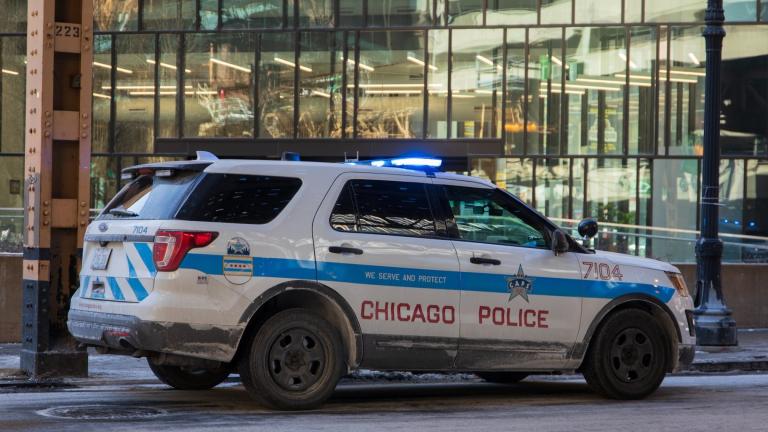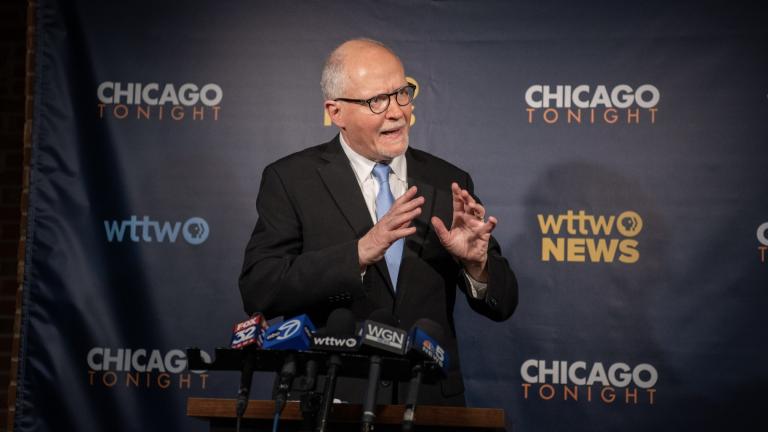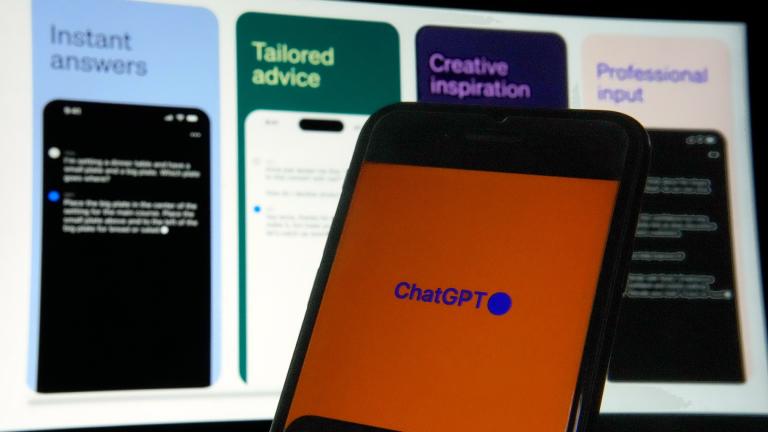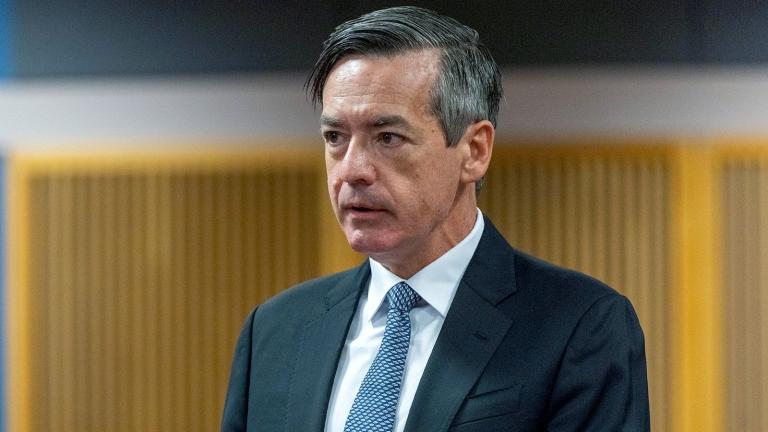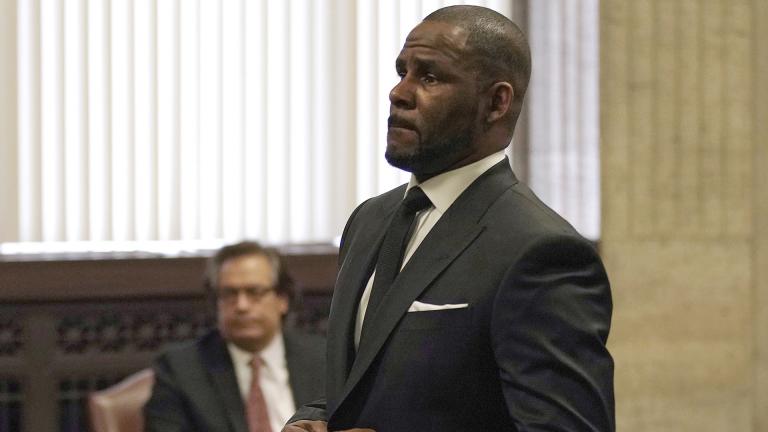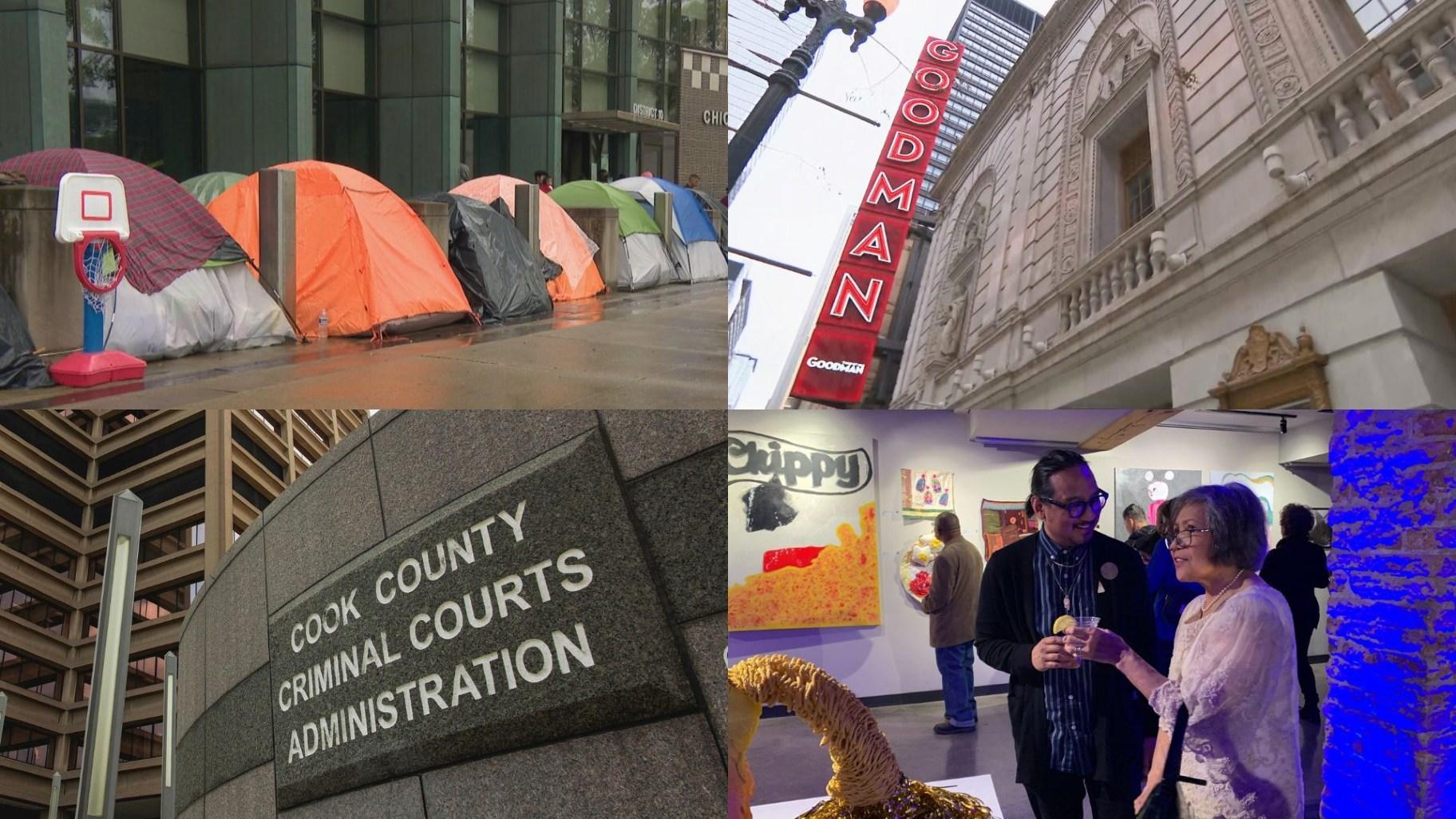 Top left: Migrants are sleeping in tents outside Chicago police stations. (WTTW News) Top right: Goodman Theater. (WTTW News) Bottom left: Leighton Criminal Courthouse in Chicago is pictured in a file photo. (Michael Izquierdo / WTTW News) Bottom right: Artist James Bulosan, left, and artist Tita Recometa-Brady, having a conversation at the “More than Lumpia” art exhibit on Oct. 6 at the Epiphany Center for the Arts. (Eunice Alpasan / WTTW News)
Top left: Migrants are sleeping in tents outside Chicago police stations. (WTTW News) Top right: Goodman Theater. (WTTW News) Bottom left: Leighton Criminal Courthouse in Chicago is pictured in a file photo. (Michael Izquierdo / WTTW News) Bottom right: Artist James Bulosan, left, and artist Tita Recometa-Brady, having a conversation at the “More than Lumpia” art exhibit on Oct. 6 at the Epiphany Center for the Arts. (Eunice Alpasan / WTTW News)
Mayor Brandon Johnson this week unveiled his $16.6 billion spending plan for 2024. Meanwhile, as the Israel-Hamas war raged on, Gov. J.B. Pritzker said Illinois “unequivocally” stands with Israel, and the Chicago City Council condemned Hamas’ attack on Israel — but not without contentious debate. Illinois confirmed its first measles case since 2019, and state lawmakers are seeking input on Chicago’s elected school board map.
Here are five stories you may have missed this week:
Patrick Taylor, who spent 16 years in custody following his arrest and conviction in the fatal shooting of a suburban rapper in a Rolling Meadows home, was set to be released this week after prosecutors dropped charges against him.
Taylor was arrested in connection with Marquis Lovings’ 2006 murder and was later convicted in 2011 at trial. But Taylor’s attorneys contend that conviction was based solely on mistaken eyewitness testimony. Read more
2. Johnson Sets Aside $150M to Care for Migrants in 2024, Less Than Half of 2023 Costs
Mayor Brandon Johnson set aside $150 million to cover the cost of housing, feeding and caring for migrants sent to Chicago from the southern border in 2024, even though that is less than half of what the city will have spent to care for asylum seekers through the end of 2023.
Johnson asked the City Council to earmark less than the full projected cost to care for the migrants to acknowledge that the burden should not fall entirely on Chicago taxpayers, according to Cristina Pacione Zayas, Johnson’s first deputy chief of staff. “This should not just be on the shoulders of Chicago,” Pacione Zayas said, noting that immigration is a responsibility of the federal government. Read more
Many Chicago theaters are in crisis mode. Live theater attendance in Chicago has dropped by 60% in the last four years, and a new report revealed theaters are facing multiple challenges — including dwindling audiences, increased costs due to inflation and decreases in private donations.
With federal pandemic relief funds having come to an end, many institutions, in particular nonprofit ones, are facing an uncertain future. Even beloved and respected theaters like Steppenwolf and Lookingglass have been forced to lay off staff or suspend productions. Read more
4. Columbus Statues Remained in Storage on Another Columbus Day, More Than 3 Years After Removal
For the fourth year, Chicago’s Joint Civic Committee of Italian Americans marked Columbus Day while the city’s three statues of Christopher Columbus remain in storage, hidden from public view. Mayor Brandon Johnson has been noncommittal about the fate of the statues, saying in June that he would follow the “direction” of the people of Chicago about their ultimate fate.
Former Mayor Lori Lightfoot removed the statues on July 24, 2020, after the statue in Grant Park became a flashpoint for protests against racism and police brutality in the wake of massive social justice protests touched off by the police murder of George Floyd. The civic committee sued the city in July 2021. Read more
Filipino American History Month in October puts a spotlight on the achievements of Filipino Americans, the stories of Filipino Americans throughout history and how that history is still felt today. It also highlights the ways in which that history is often overlooked in the U.S. In Chicago, Filipino Americans have been working to change that.
The University of Illinois Chicago offered Introduction to Filipino American Studies for the first time this semester. The documentary “Food Roots” follows Chicago restaurant owner Billy Dec as he travels the Philippines to explore his family’s history and culture through learning recipes from his last living elders. And more than 300 people attended the opening reception of the “More than Lumpia” art exhibit. Read more

